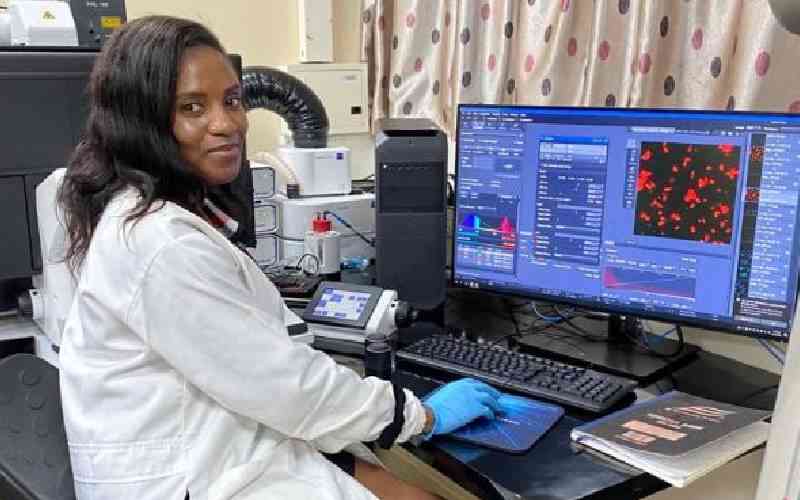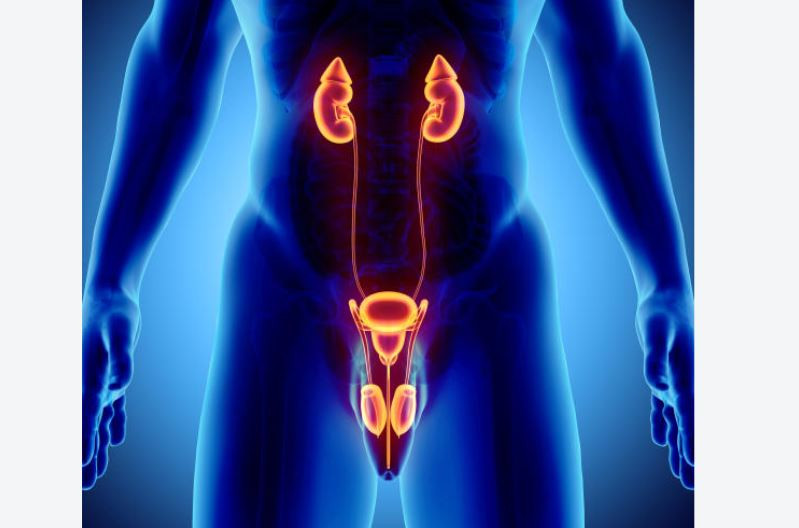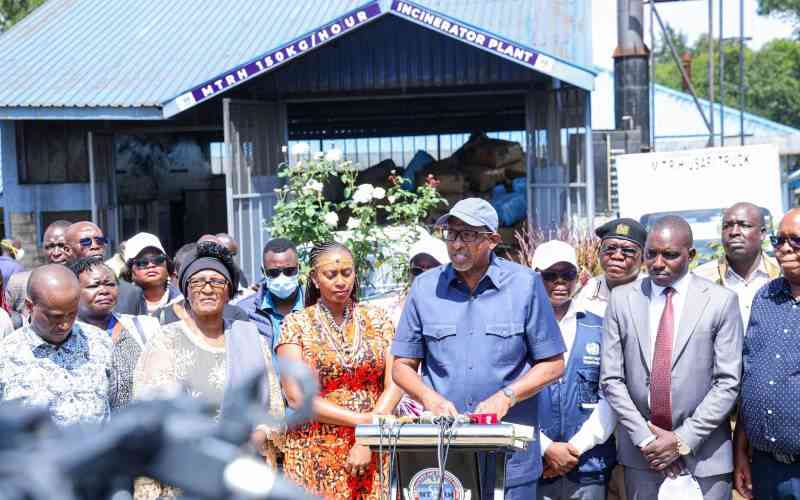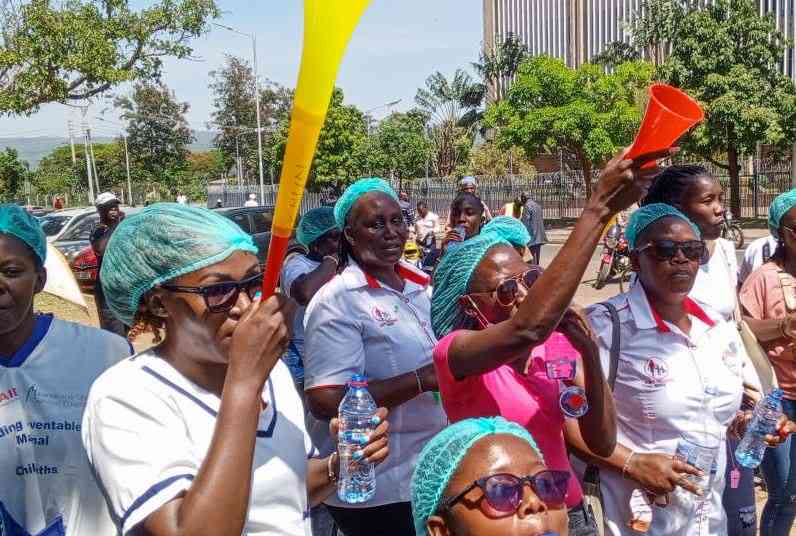
In her formative years as an eight-year-old, she dreamed of soaring the skies as an air hostess, intrigued by the marvel of the big bird. However, the dream of becoming a flight attendant shifted in high school when her curiosity for genetics was awakened, driven by a desire to understand genetic disorders.
Growing up, she had witnessed the challenges of sickle cell anaemia in her community, observing children frequently hospitalized and undergoing blood transfusions. Today, she is pursuing other skies, unravelling the mysteries of life through the science of genetics.
Ethel Webi's fascination with organisms' genetic makeup led her to pursue Genomics at Jomo Kenyatta University of Agriculture and Technology (JKUAT). Her passion for understanding the intricate codes of life also led her to earn a Master's degree in Molecular Biology and Bioinformatics.
Now, as one of ten fully sponsored Feed the Future Innovation Lab fellows, Webi is nearing the completion of her four-year PhD in Genomics at the University of Nairobi, adding knowledge on managing the top cattle killer disease in Kenya and sub-Saharan Africa, East Coast Fever.
Her late mother, who was a teacher by profession, Maximilla Webi, has been her biggest motivator, she encouraged her to pursue a Master’s degree and beyond and was always there offering support when she experienced challenges. 'I feel like she is the one who got me where I am today," she says
Webi is working on a vaccine for East Coast Fever using CRISPR-Cas9, a biotechnology tool for genome editing. Her research focuses on Theileria parva, a parasite that causes East Coast fever in cows. She aims to identify the genes in the parasite that harm cows and remove or change them to weaken the parasite, hence developing an effective vaccine.
"The parasite remains alive but is no longer deadly," she explains. "Its purpose is to stimulate an immune response so that, even after infection, the animal does not suffer from the disease," she said.
- How researcher is tackling East Coast Fever with science
Keep Reading
She explains that the ECF vaccine is being developed in several phases. The first step was establishing a genetic manipulation method for the parasite because it did not have one. This method, known as transfection, involves introducing DNA, RNA, or protein into cells or organisms.
She says the second phase was identifying the genes unnecessary for the parasite's survival to demonstrate that the genome editing approach works. According to Webi, understanding how genes function requires genetic manipulation and a reliable system for growing the organism in the lab.
"We have identified genes that we think are unnecessary for the parasite's survival, as well as those that are potentially harmful to the cow. The next phase involves introducing CRISPR-Cas9 components into the parasite to remove these genes. This phase presents significant challenges since the parasite cannot currently be grown in the laboratory, and it is typically found mixed with tick material rather than in a purified form, complicating experimental procedures. However, once CRISPR-Cas9 editing is established, we will be able to determine the functions of these and other genes and remove the harmful ones,” she adds.
Webi also explains that this vaccine will be unique because it will not need to be combined with antibiotics like the existing vaccine Infection and Treatment Method (ITM). This CRISPR-edited vaccine will eliminate the constant exposure of animals and the environment to antibiotics which can contribute to Antimicrobial Resistance (AMR.)
She focused on the live-attenuated vaccine because it provides a stronger and more durable immune response due to the broader range of antigens presented, which is an improvement over the current East Coast Fever vaccine.
Despite the challenges, Webi is not quitting. After completing her PhD, she plans to continue working on projects involving East Coast Fever, such as focusing on the host (cow) or other biotechnology-related projects.
Webi's journey has been challenging, too, but she has been fortunate to have a strong support system. Her supervisors, including Prof George Obiero, Prof Paul Ndegwa, from the University of Nairobi and others like Dr Hussein Abkallo and Dr Lucilla Steinaa, from ILRI have been instrumental in her success, providing the academic support and psychological guidance she needs.
After experiencing those challenges, Webi and her team have written a paper on the status of genome editing in apicomplexan parasites, highlighting the success stories, the challenges, and what the future holds.
Ethel Webi is one of the ten fully sponsored PhD fellows under the Feed the Future Innovation Lab for Animal Health (AHIL) program, which is being implemented in 600 households in Narok County in Kenya to improve human nutrition, economic welfare, and resilience by removing constraints to cattle health and production in Kenya and the East Africa region.
Washington State University leads the AHIL consortium with Kenya-based partners, including the University of Nairobi, the International Livestock Research Institute, and Scientists from the Kenya Medical Research Institute and Kenya Agricultural and Livestock Research Organization.
Ahil Director Professor Thumbi Mwangi said that the programme, now in its fifth year, has combined cutting-edge laboratory methods to develop and improve livestock vaccines and diagnostics.
Prof Thumbi explained that Training PhD fellows like Webi is part of mentoring the next generation of animal health researchers, who are committed to enhancing the lives of people reliant on livestock for their livelihood through better nutrition and household economics.
The five-year program combines laboratory and field intervention studies to improve the uptake of animal health interventions and measure the impact on household well-being and the nutritional status of women and children.
The Feed the Future Innovation Lab for Animal Health is a five-year cooperative agreement funded by the USAID Bureau for Resilience, Environment, and Food Security.
Her childhood dream of becoming an air hostess remains close to her heart. Although her academic path led her to the intricate world of biotechnology, her passion for travel, cultures, and connecting with people remained strong.
As Webi's PhD draws to a close, she is excited about the potential impact of her research. Her significant contributions to the field of genomics, particularly in understanding and combating East Coast Fever, can potentially shape the future of disease research and public health worldwide.
 The Standard Group Plc is a multi-media organization with investments in media platforms spanning newspaper print
operations, television, radio broadcasting, digital and online services. The Standard Group is recognized as a
leading multi-media house in Kenya with a key influence in matters of national and international interest.
The Standard Group Plc is a multi-media organization with investments in media platforms spanning newspaper print
operations, television, radio broadcasting, digital and online services. The Standard Group is recognized as a
leading multi-media house in Kenya with a key influence in matters of national and international interest.











